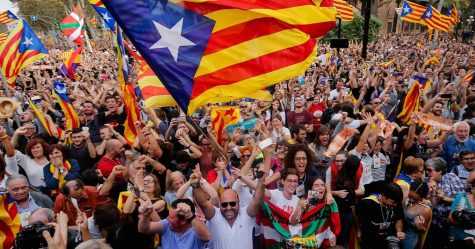The Ripple Effect: Looking ahead for Catalonia
The people are as much in the wrong as the government response is

Consider: a region has its own language, its own flag, its own — wait, I’ve been over this before.
It’s been two weeks since I last addressed the secessionist rumbles in Catalonia, and here we are again. The issue, simply to recap, is this: secessionists in Catalonia, a region in Spain, called an independence referendum in spite of the main government in Madrid declaring it illegal. The Spanish government responded by sending troops to bar people from voting.
Now, the Spanish government has swooped in and temporarily snatched away Catalan autonomy, former Catalan president Carles Puigdemont mysteriously disappeared to Belgium and on Dec. 21, votes will be cast to elect a new Catalan government.
That December vote can proceed one of two ways: peacefully, without contention over the validity of the results, or tumultously, throwing Spain into even more chaos. It’s on not only the Spanish government, but the voters too, to steer their way towards the former option.
The Spanish government already needs to tread lightly, seeing as intimidation tactics doth not a democracy make — or rather, missteps like meeting a peaceful vote with armed troops already look as un-democratic as one can get.
Article 155 of the Spanish constitution, which allowed Prime Minister Mariano Rajoy to strip down Catalonia’s autonomy, was considered the “nuclear option”: It hadn’t been touched since Spain’s return to democracy in the 1970s. Using it is already a blistering turnabout; using it on a region that prided itself on being one of Spain’s most autonomous is even more so.
Such a move is bound to inflame secessionists. Even if they’re in the minority, when the polls open up again in December, they’ll likely be the first ones there to protest the outrage. With this in mind, the simmering tensions needn’t be exacerbated more by further forceful actions.
The burden isn’t only on the Spanish government, either. The secessionists may be a minority, but the silent majority — pro-Spain, pro-Catalonia, proud of its dual identity — needs to speak up. I wrote before about how a vote is useless in a democracy if it doesn’t include everyone, and about how leaders shouldn’t accept such a vote as representative of the people they lead, but just as much responsibility lies on those voting.
I don’t intend to criticize what attempts the anti-secessionists have made at making their voice heard — rallies, demonstrations and more — but none of those actions will mean anything if a vote isn’t cast. Rallies and the like only serve as a thermometer for the mood of the people. Votes show what they really want.
Don’t slip into complacency. A loud voice doesn’t translate to paper; numbers do.
Certainly, demonstrations can influence which way politicians face, but in instances where everything hinges on the vote (like Catalan independence, and Puigdemont’s frantic grasping of the fact that of the 43 percent of Catalan voters who went to the polls, 90 percent voted for secession), there isn’t another option. And the thing that many don’t take note of is that in all instances, everything hinges on the vote.
Take America’s own year-old presidential election: I alone ran into several people last year wearing stickers touting Bernie Sanders or Hillary Clinton on their faces, but when the time rolled around to cast a ballot, many of them told me that they figured their vote didn’t matter, anyway, because they were “obviously” the majority based on their sheer vocalness within their own bubbles. But then, according to FiveThirtyEight, the registered voters who didn’t participate last year tended to be Democrats — and now we have a Republican president.
Don’t slip into complacency. A loud voice doesn’t translate to paper; numbers do.
So, Catalonia: try your hand at voting once more in December. Hopefully, there are no more roadblocks — either in the form of heavy-handed government interference or reluctant voters.







